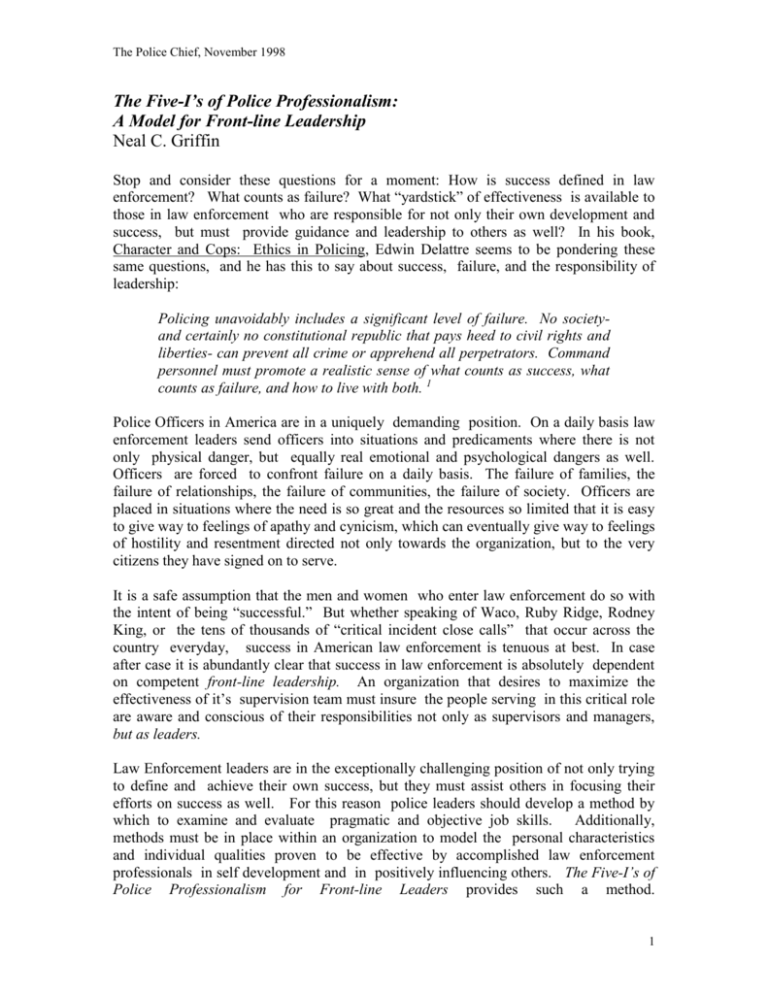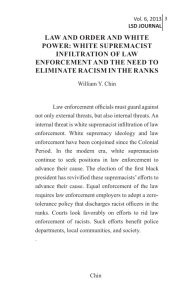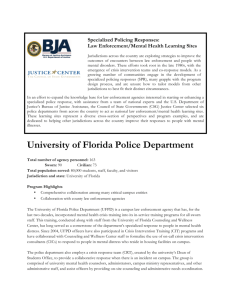Five-I's of Police Professionalism: Front-line Leadership Model
advertisement

The Police Chief, November 1998 The Five-I’s of Police Professionalism: A Model for Front-line Leadership Neal C. Griffin Stop and consider these questions for a moment: How is success defined in law enforcement? What counts as failure? What “yardstick” of effectiveness is available to those in law enforcement who are responsible for not only their own development and success, but must provide guidance and leadership to others as well? In his book, Character and Cops: Ethics in Policing, Edwin Delattre seems to be pondering these same questions, and he has this to say about success, failure, and the responsibility of leadership: Policing unavoidably includes a significant level of failure. No societyand certainly no constitutional republic that pays heed to civil rights and liberties- can prevent all crime or apprehend all perpetrators. Command personnel must promote a realistic sense of what counts as success, what counts as failure, and how to live with both. 1 Police Officers in America are in a uniquely demanding position. On a daily basis law enforcement leaders send officers into situations and predicaments where there is not only physical danger, but equally real emotional and psychological dangers as well. Officers are forced to confront failure on a daily basis. The failure of families, the failure of relationships, the failure of communities, the failure of society. Officers are placed in situations where the need is so great and the resources so limited that it is easy to give way to feelings of apathy and cynicism, which can eventually give way to feelings of hostility and resentment directed not only towards the organization, but to the very citizens they have signed on to serve. It is a safe assumption that the men and women who enter law enforcement do so with the intent of being “successful.” But whether speaking of Waco, Ruby Ridge, Rodney King, or the tens of thousands of “critical incident close calls” that occur across the country everyday, success in American law enforcement is tenuous at best. In case after case it is abundantly clear that success in law enforcement is absolutely dependent on competent front-line leadership. An organization that desires to maximize the effectiveness of it’s supervision team must insure the people serving in this critical role are aware and conscious of their responsibilities not only as supervisors and managers, but as leaders. Law Enforcement leaders are in the exceptionally challenging position of not only trying to define and achieve their own success, but they must assist others in focusing their efforts on success as well. For this reason police leaders should develop a method by which to examine and evaluate pragmatic and objective job skills. Additionally, methods must be in place within an organization to model the personal characteristics and individual qualities proven to be effective by accomplished law enforcement professionals in self development and in positively influencing others. The Five-I’s of Police Professionalism for Front-line Leaders provides such a method. 1 The Five-I’s of Police Professionalism for Front-line Leaders is a leadership and influence model specifically designed for law enforcement by law enforcement to assist those charged with the awesome responsibility of not only self development, but the development of others as well. The model of the Five-I’s is based on five personal character traits: integrity, intellect, initiative, industry, and impact. Although these five characteristics are personal traits, each can be engaged as a behavior. The Five-I’s of Police Professionalism provides not only a yardstick by which to evaluate one’s own character development, but it is also useful as a model to influence and lead others. Consider the following analysis of each of the components of the The Five-I’s model. The First “I”: Integrity: Many people argue effective leadership can not take place in the absence of personal integrity, but, in many a historical example, this simply does not ring true. Leadership in the absence of integrity can and often does occur, but it is immoral leadership. History is replete with highly effective yet highly immoral leaders. Leaders motivated by greed, lust, or personal profit and gain, are an all to common human phenomenon. But effective law enforcement leadership can not occur in the absence of both personal and professional integrity. Clearly there is no place for immoral leadership in law enforcement. Few work environments in America can equal the demands placed on police officers for individual character and moral integrity. Front-line leaders must be aware and mindful of the art of leadership as it relates to mentoring, developing, and evaluating officers in these areas. To do this effectively the leader must be steep with personal integrity. As imperative as integrity is to law enforcement leadership, it does not come cheaply. Integrity is the highest of human achievements. Integrity has been defined as the settled disposition of doing right when there is no one there to make you do it but yourself. It is a self imposed obedience to moral principle. It is a uniquely human quality in that it involves the ability to reflect and consider one’s actions, and then judge those actions to be good or bad, right or wrong, moral or immoral. As the word would seem to indicate, integrity must be an integral part of a person’s character. Integrity is represented by core personal values such as trustworthiness, courage, honesty, self-discipline, and tolerance. Integrity is conceptually based, intellectually demanding, and morally uncompromising. It is a matter of character, not personality. It is character that matches words with deeds in a way that exudes consistent honesty and forthrightness, not insincerity and selfish manipulation of circumstances to one’s own advantage. In addition to this strongly developed characteristic of personal integrity, the successful law enforcement leader will combine an equally accomplished sense of professional integrity. 2 In the context of leadership, professional integrity is necessary for evaluating, or more candidly, judging, the actions of another. Leaders with integrity judge others with fairness, impartiality, wisdom, and compassion. In other words, leaders with integrity judge with justice. Leaders with a strong sense of professional integrity do no merely acknowledge a code of ethics, they integrate that code into their daily activities and influence others to do the same. Leaders with professional integrity adopt a sense of loyalty to the ethical ideals of law enforcement, and avoid allowing personal loyalties to become misguided and the ethical equivalent of following the herd or taking care of a friend. In organizations where personal and professional integrity have not been sufficiently modeled and emphasized by the front-line leadership, seemingly minor acts of misconduct are often ignored by supervision to avoid conflict or labor hassles. When these minor acts are committed by unscrupulous officers without fear of reprisal from peers, supervisors, or commanders, the results are analogous to a cancer invading the body. If the cancer is ignored it will continue to grow to a point where the treatment to rid the body of disease becomes increasingly radical. As the severity of the required treatment grows so does the eventual recovery period. Following this logic, these “minor” acts may lead directly to major incidents of misconduct resulting in public scandal and a complete loss of public trust. Front-line law enforcement leaders must recognize their responsibility in maintaining an ethically healthy department. An ethically healthy department is characterized by a strong sense of personal and professional integrity at every level, and an expectation that conscious acts of misconduct, whether of a minor or serious nature, will result in fair and timely discipline. The need for noble character in police work is no myth. It is a greater reality today than ever before. No job in America can equal the moral and ethical demands which are placed on those serving communities as police officers. Front-line law enforcement leaders must be cognizant of this fact, and recognize their responsibility to set and enforce the moral and ethical standard of the organization. The only standard which is acceptable for law enforcement in post-modern America is one of incorruptibility and zero tolerance to any and all acts of intentional or malicious misconduct. The Second “I”: Intellect Many people outside the criminal justice system do not readily associate intellectual prowess with police work. In fact it is probably fair to say that most people do not remotely make this association. Regardless of the perception of Americans at large, the fact is that when professionally accomplished law enforcement is as intellectually demanding as any endeavor in our society. To do the job well, to do it with a true sense of professionalism, the intellectual requirements are daunting. Intellect is the linchpin of credibility for law enforcement leaders. In recent years every law enforcement role has become increasingly complex, but none more so than the positions of leadership. More and more entry level officers hired today have advanced 3 educational degrees. The day of the twelve year education requirement is nearly a thing of the past. Police Leaders must keep pace by maintaining comprehensive job knowledge, as well as by pursuing formal or personally designed educational plans in disciplines such as social sciences, human relations, counseling, organizational behavior, and management. One of the most effective methods of developing a strong intellect for leadership is to concentrate on developing an understanding and command of each domain in the “Law Enforcement Intellectual Job Description” or “IJD.” Law Enforcement Intellectual Job Description Job Related Knowledge PROCEDURAL AND TECHNICAL DUTIES Report writing Legal codes Department Procedures Law and Policy DISCRETIONARY AUTHORITY/ ENFORCEMENT ISSUES Issues of force Search and Seizure Emergency Driving Arrest and Detention C.A.R.P.E. Professionalism Ethics Diversity Harassment Issues Advanced Educational Accomplishments The Law Enforcement Intellectual Job Description represents the intellectual profile of the successful law enforcement front-line leader. The ideal law enforcement front-line leader not only possesses highly developed job related knowledge but integrates the knowledge with advanced educational accomplishments leading to mastery in three domains of knowledge: procedures, discretion, and conceptual attitudes relevant to police education (C.A.R.P.E.). In modern day law enforcement nearly every challenge faced will involve each of the domains found within the IJD. To concentrate skills and development in just one or two of the domains runs the risk that major issues will be mishandled. The complete interdependent-integration of these domains as represented within the center of the Venn diagram represents the attainment of true professionalism and excellence in front-line leadership. When problem solving, whether dealing with an issue of staff work or managing a fast past critical incident in the field, the intellectual leader brings all knowledge domains to bear. Although integrating the knowledge of each domain is imperative, each of the domains contains different critical skills. 4 Knowledge of Procedural Duties: Clearly no one can know it all in a field so diverse as the policing of America, but none the less, front-line leaders must maintain a working knowledge of the major procedural and technical aspects of the primary duties of their officers. This includes a working knowledge of enforcement codes, current case law, department instructions, and management policies to name just a few. These areas represent the “black and white/bread and butter” issues of law enforcement, and a leader’s credibility and effectiveness is dependent on competence in this domain. Issues of Discretionary Authority: The discretion granted to police officers in America represents a special kind of trust and liberty. It is the moral responsibility of law enforcement leaders to safeguard this trust and liberty, by regularly evaluating and critiquing an officer’s ability to exercise proper discretion. In order to make this evaluation, leaders must remain abreast of issues related to physical detention and arrest, forcible entry, pursuit driving, and deadly and non-deadly force. C.A.R.P.E.: The “philosophical side” of law enforcement is represented by issues such as the philosophy of constitutional law, the moral obligations of public service, law enforcement ethics, professional tolerance, diversity in the work place, and the art of leadership. Knowledge of, and a true appreciation for these issues are basic intellectual requirements for effective law enforcement leadership. Although exposure to this domain may be limited in certified police training, there is no shortage of material available in colleges and universities in nearly every community in America. In these days of check the box forms and procedures that replicate paint by numbers mentality, it is easy to leave the intellectual considerations to lawyers and judges. But it is the responsibility of every law enforcement leader to challenge themselves intellectually by developing a conceptually based and highly refined understanding of the complex legal and social issues relative to policing America. Police leaders must concentrate on continually improving their own intellectual capabilities, and effectively transferring the knowledge in a way that develops and advances the IJD of their subordinates as well. By concentrating on these areas, effective front-line leaders demonstrate an awareness of the need for ongoing professional development, and an educational plan designed to master the complexities of modern law enforcement duties. The Third “I”: Industry A well developed sense of industry is one of the most important examples a police leader can set. The characteristic of industry in front-line leaders is what sets the pace for the rest of the organization. Industrious leaders are those who possess work habits that are results oriented as opposed to activity driven. Leaders with a well developed sense of industry are heavy on follow through and always have the end result in the front of their mind. Industrious leaders possess a work history which reflects an ability to manage and supervise complex tasks through effective delegation and influence. 5 Perhaps most importantly, the industrious leader realizes that work in a fundamental sense is simply applied effort. The method by which that effort is applied and the accompanying attitude is what creates the work ethic. Policies can be written and rules can be made in an attempt to encourage (or in some cases instill) the proper work ethic amongst line level personnel. But no written policy and no rule of conduct serves as a better motivator than the leader who provides the proper example of industriousness. With the ever expanding duties and expectations attached to law enforcement, an industrious and properly motivated work ethic must be established, modeled, and encouraged by the front-line leader. Those who do not provide this example have the exact opposite effect. There is no place in law enforcement leadership for those on career cruise control. Those who have sought promotion for the purpose of improving their retirement benefits or in the hope of reducing their work load are in no position to lead others. On the other hand, there are those in positions of law enforcement leadership who possess a work ethic that places individual accomplishment and personal recognition above mission accomplishment, teamwork, and subordinate development. Persons with this style of self-gratifying work ethic will lower officer productivity as well as officer morale, and will soon find themselves complaining that the only work getting done is what they do for themselves. No policy can overcome the example set by a person in a position of leadership who displays either a substandard or self-gratifying work ethic. The Fourth “I”: Initiative There are many phrases which begin with the words, “There are ‘x’ types of people in the world” but in terms of initiative there is a very good one. There are three types of people in the world: those who make it happen, those who watch it happen, and those who wonder what happened. Law Enforcement front-line leaders must be those who, either directly or through the proper and effective influence of others, make it happen. Action is an essential ingredient of initiative. So much so that when it comes to accomplishing the mission or resolving a challenge, at the very least a leader must “take the initiative” and, in many cases, a leader will even “seize the initiative.” In terms of front-line leadership, initiative is not waiting or watching, it is doing and showing. It is demonstrative and performance based. Initiative demonstrates a desire to move forward and problem solve. In the context of front-line leadership, this desire is broad in scope and long in range. Initiative isn’t only fixing the problem, it is preventing the problem from reoccurring as well. The person who is unable to conceptualize initiative on this level will find great difficulty functioning in a front-line leadership position. Often those in a positions of leadership who lack initiative take on a cavalier attitude meant to deride those who encourage originality and creativity amongst their subordinates. In reality, those in positions of leadership who lack initiative are often those most fearful of conflict, criticism, failure, and risk taking. The fear may be disguised as being practical or non-chalant, or by adopting an attitude of “why change it if it’s not broken?” but it is fear none the less. The fear may appear to be nothing more than an apathetic attitude, but in terms of front-line leadership fear and apathy are close 6 companions. Front-line leaders lacking in initiative are content with officers who approach their job with an attitudes such as “no career cases” or “a ticket a day keeps the Sergeant away.” An officer who is allowed to consider a ticket a day the equivalent of initiative is misinformed as well as mislead. Law Enforcement professionals can no longer afford to associate the concept of initiative with simply writing a citation or completing a field interview. These activities must be seen for what they are: mere steps in the initiation of a long range and much larger plan. Law Enforcement leaders must establish and model activity that goes beyond daily duties and assignments, and encourages activity and initiative consistent with the long term goals of a modern law enforcement agency. The Fifth “I”: Impact Everyone has met the police officer who can arrive on a scene, quickly evaluate the circumstances, and immediately begin orchestrating a response that deploys officers and equipment in way that moves even the most serious problems towards resolution. Much of this skill is based on the personal quality of positive impact. Positive impact is characterized by a presence of confidence, competence, and a positive attitude. Whether formally or informally, officers with positive impact often assume roles of leadership. Suffice it to say that positive impact is always a worthwhile character trait in a law enforcement officer, but for the front-line leader it is an absolutely essential quality. Leaders with positive impact are able to significantly and positively influence others, in and out of the work place, even under the most stressful of circumstances. Positive impact is accomplished in a number of ways. One major method of delivering positive impact is through well developed communication skills that cover the gambit of verbal, non-verbal, and active listening skills; and, the ability to employ these skills across the full spectrum of their law enforcement responsibilities. Leaders with positive impact are characterized by a continual effort to set the highest standard of excellence in all professional endeavors through the axiom of leadership by example. Positive impact has very little to do with self-perception; it is not a personality contest. Positive impact is the sum of those personal qualities and characteristics that define how a person is perceived by others along with the power of their actual influence. Positive impact is synonymous with influence ability. The quality of positive impact is so vital to effective leadership, that is important to define negative impact as well. Negative impact is a serious determent to law enforcement leadership. Negative impact can be described as the inability to effectively communicate, coupled with a poor physical presence and a lack of self confidence. When negative impact is displayed by a front-line leader, officers and citizens alike feel less confident in their police organization. This can effect an officer’s morale as well as their job performance, and it may cause citizens to feel less supportive of their police. It is a primary role of front-line leaders to prepare officers for the challenges, pitfalls, and dangers they will face. One of the key defenses available to police officers against 7 the emotional, psychological, and physical ravages of law enforcement is for front-line leaders to concentrate on their responsibilities of not only defining what counts as success, but in assisting others in attaining success as well. The Five-I’s Front-line Leadership Model provides a pathway to defining and attaining success in law enforcement. The Five-I’s are those qualities, characteristics, behaviors, and attributes that when fully developed in the individual officer allow for a maximum level of professional achievement. When applied to leadership, The Five-I’s Model provides those who are serious about their responsibilities as front-line leaders with a method of maximizing their own development as well as maximizing their ability to positively influence the development of others. The men and women serving our nation as police officers deserve nothing less. 1 Edwin Delattre, Character and Cops: Ethics and Policing (Boston, MA: Boston University, AEI Publishers, 1995), p. 100 8





